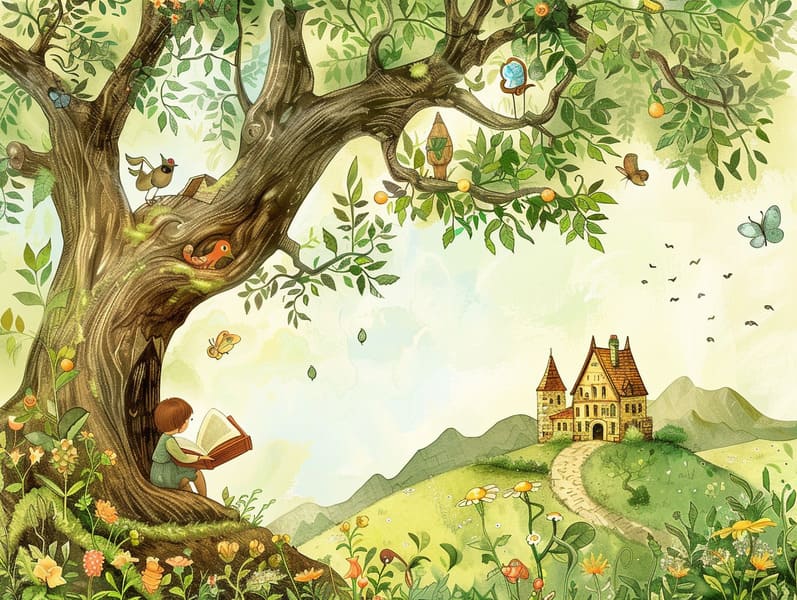Discovering the Charm of Sleepy-time Fables: Building Beloved Moments with Your Children
Discovering the Charm of Sleepy-time Fables: Building Beloved Moments with Your Children
Blog Article

Evening is a sacred time for moms and dads with their little ones. It’s a chance to unwind, get cozy, and share the wonder of nighttime tales.
For generations, bedtime stories for kids have been a beloved practice, offering more than just a way to slumber. They provide an occasion for togetherness, knowledge acquisition, and igniting imagination.
Bedtime Stories: Why They Matter
Bedtime stories for kids mean more than a way to close the day. They play a essential role in a child’s growth and in reinforcing the parent-child rapport. Here’s why they are beneficial:
1. Shared Moments: Reading together at bedtime creates a special period of closeness between moms and dads with their little ones. It’s a moment of closeness that helps children feel important and safe.
2. Language Acquisition: Enjoying narratives helps children develop their communication skills. They acquire new vocabulary, understand language rules, and refine their auditory and analytical skills abilities.
3. Inventiveness: Kids' stories take them to fantastic worlds, fostering fantasy. They imagine characters, settings, and adventures, which fuels their creativity.
4. Feeling Recognition: Children’s stories often present characters facing issues and emotions. These accounts help kids handle and process their own sentiments, developing emotional intelligence.
5. Thinking Skills: Following a story helps children develop awareness, remembrance, and logical thinking. They improve to follow scripts, remember pieces, and anticipate results.
Integrating Bedtime Stories into Your Night
Establishing a bedtime habit that has reading narratives is easy and fulfilling. Here’s how to turn it into a beloved part of your night-time custom:
1. Select a Comfortable Location: Pick a relaxing place where you and your child can huddle together without disruptions. A cozy bed or a comfortable reading nook works perfectly.
2. Choose a Specific Time: Set a designated time each night for reading. Routine helps children know what to expect and makes the routine simpler to continue.
3. Choose Age-Fitting Stories: Pick tales that fit your child’s cognitive level. Little kids might appreciate picture books with clear stories, while bigger children may enjoy detailed stories with more complex plots.
4. Animate the Tale: Make sure the tale be engaging by trying different accents and voices, adding audio effects, and inviting your child to be active. Ask things about the story to hold their attention.
5. Set a Tranquil Atmosphere: Lower the lights, use calm voices, and create a relaxing environment to help your child ease into rest.
How to Discover Bedtime Stories
There are endless ways where you can find excellent bedtime stories for children. Here are some choices to consider:
1. Books for Children: Visit your closest library or bookstore to find a large selection of bedtime stories for kids. Going through the options together can be a great activity that also enables children more info to decide on stories that they like.
2. Online Resources: There are many websites that offer free bedtime stories. Sites like online story sites provide a variety of short stories for kids that you can download. These platforms are great for finding new and interesting stories without paying.
3. Audio Stories and Apps: For nights when you’re too drained to read, consider audiobooks or storytelling apps. These can provide a calm narration to read your child a story, ensuring they still get their bedtime story fix. Apps often offer interactive features that can involve them further.
4. Personal Stories: Craft your own stories matching your child’s passions. Personalized stories can be especially engaging and meaningful. You can get your child in the crafting process, making them a part of the adventure.
Why Shorter Stories Are Best
Short bedtime stories are particularly beneficial for bedtime. They provide all the benefits of longer stories but are more to the point, making them perfect for winding down before sleep. Here’s why short stories are a excellent choice:
1. Simple and Clear: Concise narratives are clear and easy for kids to get, even after a long day. They can swiftly grasp the line and enjoy the story without losing interest.
2. Fast Engagement: Concise stories immediately engage children, capturing their engagement and creativity. This makes them ideal for keeping bedtime rituals efficient yet enjoyable.
3. Variety and Flexibility: To-the-point tales provide for variety in your bedtime tales. You can find a different story each night, keeping the routine exciting and exciting for your child.
4. Time Management: For busy parents, concise narratives are a easy way to verify children still get their nightly dose of storytelling. They fit well into a hectic schedule while still offering the full good points of a bedtime story.
The Satisfaction of "Read Me a Story"
The simple phrase, “Can you tell me a story?” can unlock a world of magic for children. Reacting to this request not only satisfies a child’s wish for attention and engagement but also creates lasting experiences. Here’s why it’s special:
1. Attachment: Storytelling to your child creates a deep emotional relationship. It’s a time for affection, sharing, and bonding.
2. Ritual: Developing a bedtime story routine creates a cherished tradition that children anticipate every night. It’s a ritual that can be passed down through generations.
3. Development Together: As you share stories, you’ll observe your child’s advancement and learning. Their reactions, reactions, and understanding of the stories evolve, offering insights into their developing minds.
4. Safe Space: Bedtime stories provide a safe space for children to deal with emotions, face fears, and find comfort in the safe presence of a parent.
In Summary
Sleep stories for kids are a important tool for developing a child’s evolution and forming unforgettable memories of connection.